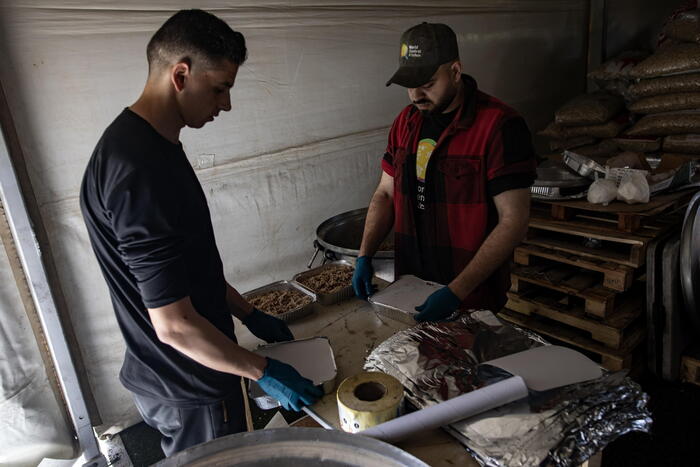The gastronomic entrepreneur Rafael Rincón at the headquarters of the Fundación Gastronomía Social in Santiago, Chile, on November 23. Cristian Soto Quiroz
Rafael Rincón's hands smelled of anchovies when he was eight years old.
The man from Madrid spent weekends at Buen Provecho, his parents' restaurant, peeling the fish slices with his little fingers, ideal for such a delicate task.
It was an illustrated tavern where food was served with the ecological and diner's well-being in mind.
Rincón became a man making coffee, opening bottles of wine and moving trays between the long bar and the five tables of the place.
“I have been an all-rounder in gastronomy since I was a child”, he tells at the age of 44 at the headquarters of the Fundación Gastronomía Social, which he co-founded and has chaired since 2019, in Santiago de Chile, where he has lived for two decades.
The non-profit organization uses gastronomy to promote social inclusion, food security,
The culinary vocation with a social sense that Rincón inherited from his parents has cemented a career plagued with risks, setbacks, and good results.
Latin America's 50 Best Restaurants, sponsored by S. Pellegrino and Acqua Panna, honored him this month with the Icon Award 2022 for the impact of his foundation in the region through collaborative and educational work.
Due to corporate problems, the Buen Provecho restaurant, which had five locations, closed.
Rincón went to study law "so they wouldn't risk it" like her parents, then separated.
They kicked him out after a year.
He lived in London, Mallorca and Barcelona, always linked to gastronomy, but looking for what to do with it to build a life for himself.
He ended up working in Madrid at the age of 25 as a publicist, married to Claudia, Chilean.
His profession paid off and they were expecting a daughter, but four months into the pregnancy his partner told him that he needed to return to his country.
They left the next day.
In the South American country, Rincón set up Foodie, an importer of natural foods in the storage room of her in-laws' house.
He grew up so fast that he quit the publicist job he'd gotten—for which he'd already won two creativity awards in just a year and a half.
While growing the company, which also became a distributor, the Spaniard began to see "what was really happening in Chile."
What was happening?
“Resorts.
They did not look outside, they did not value their own, they did not want to have a social life due to very class issues.
The bars did not have terraces.
Social life around gastronomy was very little.
A celebration of gastronomy was missing”.
That panorama shocked him more when it happened in the second largest exporter of mushrooms in the world, with 30 varieties, and whose long coastline gives it access to 120 registered fish species.
Portrait of the cultural manager and gastronomic businessman, Rafael Rincón. Co-founder and president of the Fundación Gastronomía Social at the headquarters of Santiago de Chile. Cristian Soto Quiroz
The impact generated by the Chilean reality, on the verge of impotence, led him to organize the Festival ñam in 2011, a Latin American gastronomic meeting that would showcase the country's cuisine.
Another company, the event producer Grupo Masa.
Another success.
However, something was missing from the young entrepreneur.
In 2014, he discovered what that something was in La Paz, Bolivia.
He got to know the Gustu restaurant, where only local products were consumed, and which had cooking school-workshops for young people from the most depressed areas of the city, who ended up working in the restaurant.
“I saw that it was possible,” Rincón explains with boundless energy, like someone who gets excited about a good idea for the first time.
“I arrived in Chile convinced that the next step would be a social enterprise linked to gastronomy.
From this experience, the Social Gastronomy Foundation was born, with the idea of being a restaurant-school, in June 2019. Four months later, Chile experienced the largest wave of protests since the return to democracy and many of the projects in which it was involved Corner froze.
They planned to resume in March, when the school year starts, but then the pandemic came.
“I told my partners at Grupo Masa that I couldn't continue.
There were no resources and we were an events agency.
I also said that I was leaving the foundation, ”he recalls about a time that seems black and white.
Of course, when he found out that famine was coming in Latin America, the retirement ended.
Together with three organizations, Rincón formed Cocina para Todos, a system in which they used closed restaurants, paid cooks and sunk costs to feed people.
In two weeks, they distributed 700 out-of-pocket lunches in La Pintana, the poorest municipality in Santiago.
The publicist who still lives in Spanish made a video of what they were doing to raise funds.
In two months, 800 million pesos (almost 900,000 dollars) arrived for a campaign that still exists.
The idea was replicated in Spain, Peru, Ecuador and Argentina.
That force served as a new impetus to give life to the foundation, focused on delivering culinary, entrepreneurial and environmental knowledge.
If before they used the closed restaurants to cook, now they would do it to teach.
The free curriculum includes culinary services and ventures, where they teach students -80% women- confectionery, bakery, pickles.
The idea is that they learn to cook products that they can prepare at home and sell to their neighbors.
It also has a leg to insert vulnerable people into the restaurant industry.
"In three weeks we can teach them to be assistant waiters and in a month to cook," says Rincón.
Rincón describes 2022 as an “amazing” year.
They obtained resources to develop the technology at the Inter-American Development Bank (IDB).
For culinary schools, at the Zurich Foundation, which will allow them to train 3,600 people in three years.
For the insertion of a thousand young people in restaurants in the next two years, they asked the Coca-Cola Foundation for help.
"And add and continue," says the man from Madrid, who already has everything ready to open spaces in different parts of the country, such as Antofagasta, Iquique and Valparaíso.
When Rafael and his brother, who is 11 months older, were children, they had a fantasy.
They looked at their parents' empty restaurants and imagined that they were classrooms where students, instead of sitting down to learn at desks, did so at tables to eat.
More than 30 years later, the image has come to life: "We occupy kitchens, fill them with love and magic, and transform them into schools."
Subscribe here to the EL PAÍS America
newsletter
and receive all the latest news in the region.










/cloudfront-eu-central-1.images.arcpublishing.com/prisa/2C5HI6YHNFHDLJSBNWHOIAS2AE.jpeg)




